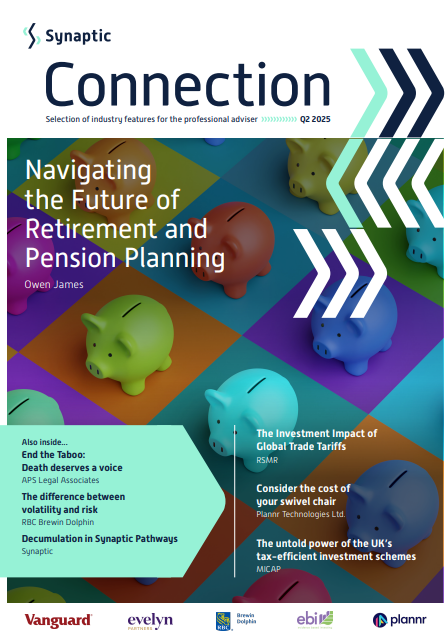In this edition...
- Navigating the Future of Retirement and Pension Planning: Key Insights for UK IFAs and Wealth Managers James Goad, Managing Director - Owen James
- Profit or Pitfall? The Investment Impact of Global Trade Tariffs Naeem Siddique, Investment Research Manager - RSMR
- Consider the cost of your swivel chair Abi Hortin, Marketing & Community Executive - Plannr Technologies Limited
- End the Taboo: Death deserves a voice Charlotte Merrills, Compliance & Associate Support Manager - APS Legal Associates
- From Calendar to Tolerance: Rethinking Portfolio Rebalancing Chris Johnston, MSc Data Analyst - ebi Portfolios
- The difference between volatility and risk Antony Champion, Managing Director - Head of Intermediaries - RBC Brewin Dolphin
- Billions in Innovation: The untold power of the UK’s tax-efficient investment schemes Prashant Trivedi, Investment Analyst - MICAP
- Decumulation in the Synaptic Pathways ecosystem Seb Marshall, Product Manager - Synaptic
- Market volatility is inevitable - Adviser’s Alpha® is enduring Warwick Bloore, Senior Specialist, Adviser Research Centre - Vanguard Europe
- Redefining Index Investment Strategies Dan Caps, Portfolio Manager - Evelyn Partners
- The FCA Protection Market study: What it means for intermediaries Kris Armstrong, Compliance Policy Manager - Simplybiz
 With its launch of its Protection Market Study, the FCA is investigating how pure protection insurance - life insurance, critical illness cover, income protection, and whole of life cover - is sold to consumers. The review focuses on whether people are getting good value for their money and if there are any problems with how products are sold.
With its launch of its Protection Market Study, the FCA is investigating how pure protection insurance - life insurance, critical illness cover, income protection, and whole of life cover - is sold to consumers. The review focuses on whether people are getting good value for their money and if there are any problems with how products are sold.
The regulator will explore how insurance intermediaries earn commission, how they influence insurance products, and whether consumers fully understand what they are buying.
How a market study works
The FCA investigates how well markets are working for consumers, generally starting with an open mind, and are forward looking. The process includes:
• Collecting data from across the distribution chain – information about how products are sold and used.
• Engaging with ‘market participants’.
• Identifying areas of harm – unfair practices or issues that could harm consumers.
• Releasing findings and making changes – the FCA intends to publish an interim report with its initial findings and proposed next steps around the end of 2025.
The FCA’s review has strong links to the Consumer Duty, requiring firms to ensure products offer good value. The FCA will assess whether consumer outcomes observed align with those expected under the Duty and/or Product Governance (PROD) rules.
The Duty is underpinning the work the FCA conducts, and how firms should treat consumers.
The good news
The FCA has been positive in its messaging, acknowledging protection products are important to consumers, and has also recognised the value intermediaries bring. Not only has the regulator recognised the main distribution channel for protection products is through intermediaries, but that this approach is cost-effective for insurers, allowing consumers to benefit from intermediaries’ expertise and market access.
How intermediaries earn commission
The FCA wants to know how commission structures dictate the market and whether this method of remuneration benefits consumers or creates conflicts of interest.
The areas identified are not only the incentives created by commission structures but also whether they result in the unnecessary consumer switching driven by intermediaries or commission practices which may not represent fair value (e.g. raising premiums to pay an intermediary higher commission).
Potential problems the FCA is looking at:
• Conflicts of interest – does commission encourage brokers to recommend certain products, even if they aren’t the best option?
• Hidden incentives – factors that influence which products are sold.
• Clawback arrangements – does this work as an effective mitigant?
We expect the FCA to examine the distribution of products, the total price paid by customers, and commission structures. Additionally, the regulator is likely to look at fees and in-house remuneration to understand how the market operates. It might also introduce clearer rules on commission transparency, mirroring developments in other sectors and to enhance consumer understanding around the service being provided.
Are Insurance products good value?
The FCA is also checking whether insurance products are priced fairly and give good value.
They’re looking at:
• Do consumers pay more than they’re likely to get back?
• Do intermediaries influence the price of policies?
• Are there unnecessary features that make products more expensive?
The FCA may ask firms to review their product governance and fair value assessments and to ensure their products work both for the insurer and the consumer.
Do consumers fully understand what they are buying?
Many people struggle to understand insurance policies. The FCA is checking whether consumers are given clear information about their policies including costs, cover and exclusions.
Concerns include:
• Are brokers giving enough detail about the pros and cons of a policy?
• Are policy documents too complex?
• Do consumers cancel policies later because they didn’t understand them properly at the start?
Firms may need to improve how they explain policies and keep better records of why they recommended a particular product. Firms should be able to show they have reviewed their sales process in light of Consumer Duty and should be able to evidence that consumers are making well informed decisions.
Could this change how Insurance is sold?
Depending on the FCA findings, there could be changes such as:
• Enhanced commission disclosures and how different commission levels affect the premiums consumers pay.
• If the FCA finds unfair sales tactics, it could introduce tougher regulation.
• The FCA could push for clearer pricing and product comparisons so consumers can easily see the best deals.
How intermediaries can prepare
To stay ahead of any changes, intermediaries should:
☑ Ensure commission structures are fair and transparent.
☑ Make sure policies provide clear benefits.
☑ Make information as simple and clear as possible.
☑ Keep records of advice given – evidence that recommendations are in the consumer's best interest.
☑ Engage with the FCA’s review process – feedback could help shape future proposals.
Conclusion
The FCA’s review could lead to changes for intermediaries. If the regulator finds commissions influence sales too much, policies are poor value, or consumers don’t understand what they’re buying, new rules could follow. However, we know the FCA’s intention going forwards, where possible, is to rely on existing standards, focusing on outcomes, rather than imposing prescriptive new rules.
In the meantime, intermediaries should continue to focus on three familiar concepts; transparency, clear communication, and ensuring their recommendations genuinely benefit customers.
Get in touch:
www.simplybiz.co.uk
01484 439100
info@simplybiz.co.uk
Sign up for updates
Keep up to speed with everything you need to know each quarter, by email or post.


